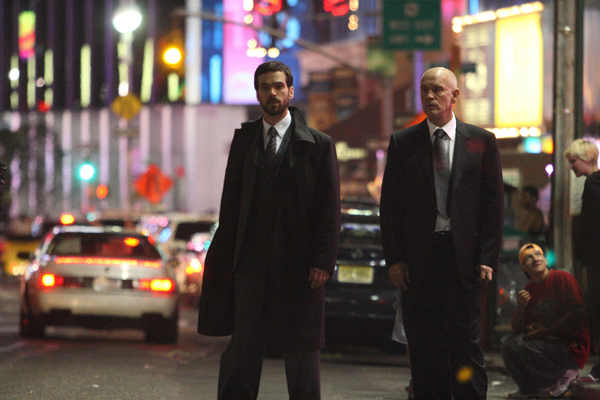Afterwards
15Have you ever wondered to yourself what happens afterwards? Not just after reading this, but a little further down the line? For many, going to the great screening room in the sky may not be their idea of heaven. If thatís the case, then good luck to them all.
Although this film from French director Gilles Bourdos deals with both life and death, itís somewhat misleading title and storyline are bound to leave you with more questions than answers.
Despite living in a nice apartment and doing very well for himself as a successful attorney, Nathan (Romain Duris) is not a happy chap. He is haunted by a past laced with death; not only did he possibly suffer from a near-death experience as a child, his own child suffered a cot death. This grief caused him to separate from his wife Claire (Evangeline Lilly) and their daughter.
One day at work however, he receives an impromptu visit from renowned Doctor Kay (John Malkovich). This somewhat bizarre meeting with him is the first of many, all leading Nathan to thinking more about the precious nature of life more than ever before.
The one main point that sticks in his mind is when Kay tells him that he can actually tell when someone is about to die. He believes that itís his duty to prepare those whose fate he knows for whatís to come. Nathan is dismissive of this message at first, but as he witnesses proof at close hand, decides that perhaps Kay is giving him the kind of opportunity that so many would grab tightly with both hands. And so begins a journey of discovery for Nathan, but one that doesnít necessarily take him to a place heís ready for.

You know Johnny, we look like we could be Men In Black. I loved that film. Did you? let's do a sequel Johnny, please?
Although the film is set in North America, Bourdos infuses it heavily with his European influences. It is, to all intent and purposes, a European art-house flick made on US soil. He even has the audacity to throw in some subtitles just to further hit home this fact. This equates to a film that prefers to frame shots beautifully and move the story along at near walking pace. If you expect anything more than this, you will be disappointed.
However those of you who are willing to accept a more visceral experience will be rewarded. Not only does the fact that Malkovichís character can see impending dead people add to the overall sensation of intrigue that haunts this film heavily, but it also helps create a few cerebral Final Destination moments. And although the results are more contemplative than thrilling, they donít make the film any less absorbing.
What Bourdos appears to do here is place more importance on the framing of his characters rather than focus on their dramatic responses to each other. What he also seems to have done, perhaps inadvertently, is assembled one of the quietest casts of all time. Between the trio of actors, none of them ever raise their voices to more than the noisiest of whispers. This just adds to the laid backness of it all; it may well be a story that concentrates on life and death, but really, thereís no need to shout about it.
But just because that none of them are loud, doesnít mean that they donít care. Malkovich is on top understated form, performing as he does in his effortless Ďless is moreí mode. Duris also appears to have studied at the same acting school, as he coolly reacts to everything that comes his way. And considering Lily spent so much time Lost on that particular island, she shows great restrain not only in her role, but also in the fact that she didnít take the easy way out by jumping on the first summer blockbuster franchise that came her way.
And even when thereís not much being said, Bourdos manages to deliver almost a visual poetry within his framing, as his camera captures image after image of pure elegance.
Itís all a bit unclear what Bourdos has planned after Afterwards Ė this is only is third film in ten years Ė but on this evidence it will certainly be worth the wait.
Afterwards then, is one of those rare films that provokes thought as opposed to obliterate any concept of thinking while watching it. It doesnít answer any of the big questions, nor does it set out to, but it may just well stir your grey matter into action nonetheless, so be prepared.
